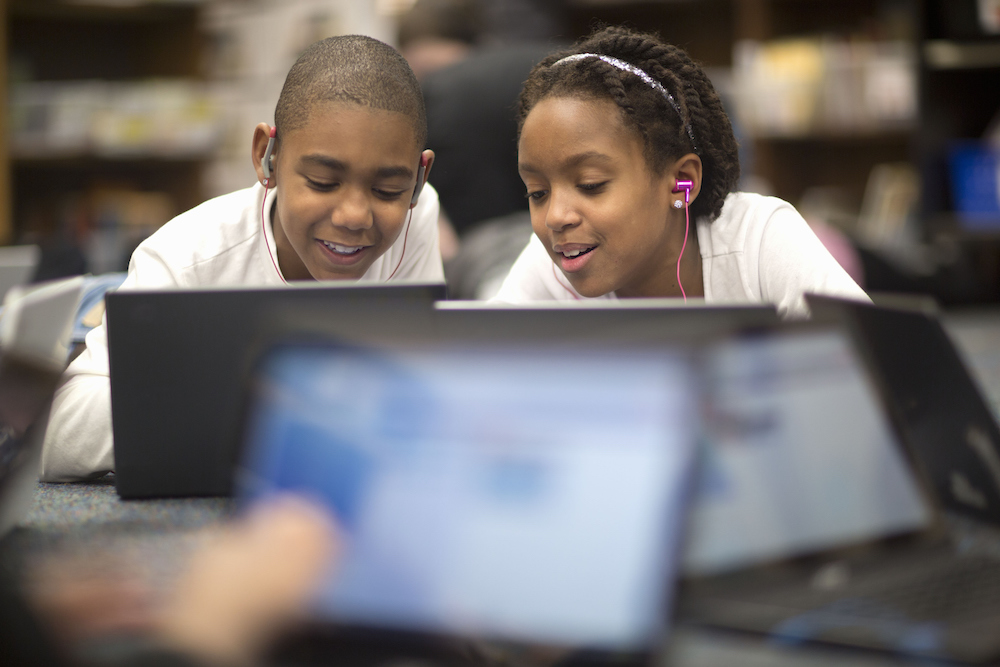Lesson 5: Digital Citizenship and Why It Matters
Before you start the lesson, make sure to read through the lesson overview and the lesson preparation. The Facilitator Guide can also help you prepare.
Lesson Overview
Learners will determine and justify why digital citizenship matters. Learners will identify the benefits and responsibilities that come with being a member of the online community. Learners will also develop an understanding of what digital citizenship means and why it is important in an online world.
Lesson Preparation
ESTIMATED TIME
ESSENTIAL QUESTION
- What does it mean to be a digital citizen?
MATERIALS
- Lined Sheet of Paper
- Pen or Pencil
PREPARATION
- Learners will need to be seated in pairs, triads, or small groups for discussion.
- Provide learners with a list of the key vocabulary for this lesson.
OPTIONAL: ISTE DIGCITCOMMIT COMPETENCY
- ENGAGED: I use technology and digital channels for civic engagement, to solve problems, and be a force for good in both physical and virtual communities.
Lesson Hook [10 minutes]
Teacher's NoteLesson hooks provide facilitators with a baseline for how much learners know prior to engaging in the content of the lesson.
Before the lesson begins, write the definition of Digital Citizenship and Wellbeing on the board (see key vocabulary).
ASK YOUR STUDENTS
- What does digital citizenship mean to you?
TELL YOUR STUDENTS
In small groups, take two minutes to read the definitions I wrote down and pick a word from the provided definition that you feel best describes what it means to be a digital citizen and provide a justification for your choice.
For example: Empathy - Best describes being a digital citizen because you have to engage with many different people online and understand who they are and their feelings in order to be a digital citizen.
Teacher's NoteAllow groups two minutes to think through and discuss. Then bring the group back together to discuss as a class.
Based on the discussion and the provided definition, have learners then generate their own definition of what digital citizenship means to them.
Share one or two examples as a class.
TELL YOUR STUDENTS
Next, we will look at the benefits and responsibilities of being a member of the online community.
Group Discussion [15 minutes]
Learners will identify the benefits and responsibilities that come with being a member of the online community.
ASK YOUR STUDENTS
- Based on our discussion and the definition that was provided for digital citizenship, what are benefits and responsibilities that come with being a member of the online community?
TELL YOUR STUDENTS
For example: A benefit is that you get to engage with people from all over the world and therefore you are responsible for respecting others' perspective.
Teacher's NoteAllow groups five minutes to think through and discuss. Then bring the group back together to discuss as a class. Possible answers include:
- Continuous development of skills.
- Empowered to use technology for good.
- Discern fact from fiction.
- Build healthy relationships.
- Stay safe.
- Find balance and wellbeing with screen time.
- Lead with empathy and communicate across diverse cultures.
- Respect other perspectives.
- Think critically about how you and others contribute to society and work together to make positive progress, online and off.
TELL YOUR STUDENTS
Next, we will discuss why these benefits and responsibilities matter.
Class Interaction [15 minutes]
Learners will develop an understanding of what digital citizenship means and why it is important in an online world.
TELL YOUR STUDENTS
In your small groups, write down 2-3 reasons why the benefits and responsibilities of digital citizenship matter.
For example: Digital Citizenship matters because the online community is no different from a physical community, and therefore must be treated with the same respect and dignity. Possible answers include:
- Online communities are places for honing active citizenship.
- Online communities are places to explore personal values.
- Online communities are places for building networks.
- Online communities are places for advocating and raising awareness.
- Online communities are places for researching and finding information that is factual.
Takeaways [5 minutes]
Recap the lesson with these points.
TELL YOUR STUDENTS
Digital citizenship is important for keeping online communities safe and respectful.
Digital citizens continue to grow and develop an understanding of what digital citizenship means and why it is important in an online world.
Benefits and responsibilities of being a good digital citizen include continuous development of skills on appropriate, responsible, and empowered use of technology. These skills include helping people to discern fact from fiction, build healthy relationships, stay safe, find greater wellbeing, build resilience, lead with empathy, communicate across diverse cultures, respect other perspectives, think critically about how they contribute to society, and work together to make positive progress, online and off.
Congrats!
You've finished the lesson



 Previous Lesson
Previous Lesson 




